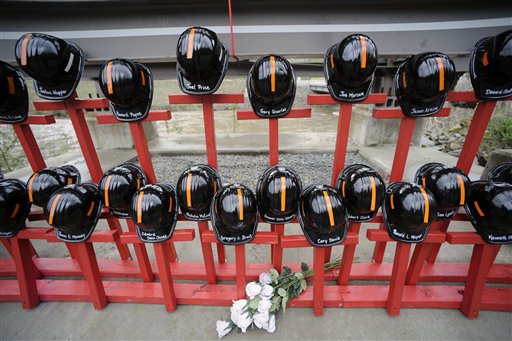Economy
Related: About this forumWest Virginia isn't the only place where state mine safety rules are being changed
West Virginia isn't the only place where state mine safety rules are being changed
Link to tweet
Mine safety rollbacks: W.Va. is not alone
March 15, 2017 by Ken Ward Jr.

As we reported here yesterday, the West Virginia Senate’s Committee on Energy, Industry and Mining met yesterday to take up SB 582, a bill to strip the state’s inspectors of any real enforcement role in coal mine health and safety (see also the companion bill introduced in the House).
A longer story in today’s print edition (and online here) provides more details about that bill, and explains that the EIM committee sent the measure to a subcommittee for further review. ... It’s interesting to note that West Virginia is not alone in its effort this year to roll back mine safety protections under state law.
This is also happening in Kentucky, and it’s already happened in Illinois.
So far, I’ve seen no meeting scheduled for the subcommittee that’s looking at the West Virginia bill … so stay tuned.
See: West Virginia Senate bill eliminates mine safety enforcement
elleng
(131,042 posts)as the misery continues:
'The United Mine Workers of America (UMW or UMWA) is a North American labor union best known for representing coal miners. Today, the Union also represents health care workers, truck drivers, manufacturing workers and public employees in the United States and Canada.[1] Although its main focus has always been on workers and their rights, the UMW of today also advocates for better roads, schools, and universal health care.[2] By 2014, coal mining had largely shifted to open pit mines in Wyoming, and there were only 60,000 active coal miners. The UMW was left with 35,000 members, of whom 20,000 were coal miners, chiefly in underground mines in Kentucky and West Virginia. However it was responsible for pensions and medical benefits for 40,000 retired miners, and for 50,000 spouses and dependents.[3]
The UMW was founded in Columbus, Ohio, on January 25, 1890, with the merger of two old labor groups, the Knights of Labor Trade Assembly No. 135 and the National Progressive Miners Union.[4] Adopting the model of the American Federation of Labor (AFL), the union was initially established as a three-pronged labor tool: to develop mine safety; to improve mine workers' independence from the mine owners and the company store; and to provide miners with collective bargaining power. After passage of the National Recovery Act in 1933, organizers spread throughout the United States to organize all coal miners into labor unions. Under the powerful leadership of John L. Lewis, the UMW broke with the American Federation of Labor and set up its own federation, the CIO. Its organizers fanned out to organize major industries, including automobiles, steel, electrical equipment, rubber, paint and chemical, and fought a series of battles with the AFL. The UMW grew to 800,000 members and was an element in the New Deal Coalition supporting Democratic President Franklin D. Roosevelt. Lewis broke with Roosevelt in 1940 and left the CIO, leaving the UMW increasingly isolated in the labor movement. During World War II the UMW was involved in a series of major strikes and threatened walkouts that angered public opinion and energized pro-business opponents. After the war the UMW concentrated on gaining large increases in wages, medical services and retirement benefits for its shrinking membership.'>>>
https://en.wikipedia.org/wiki/United_Mine_Workers